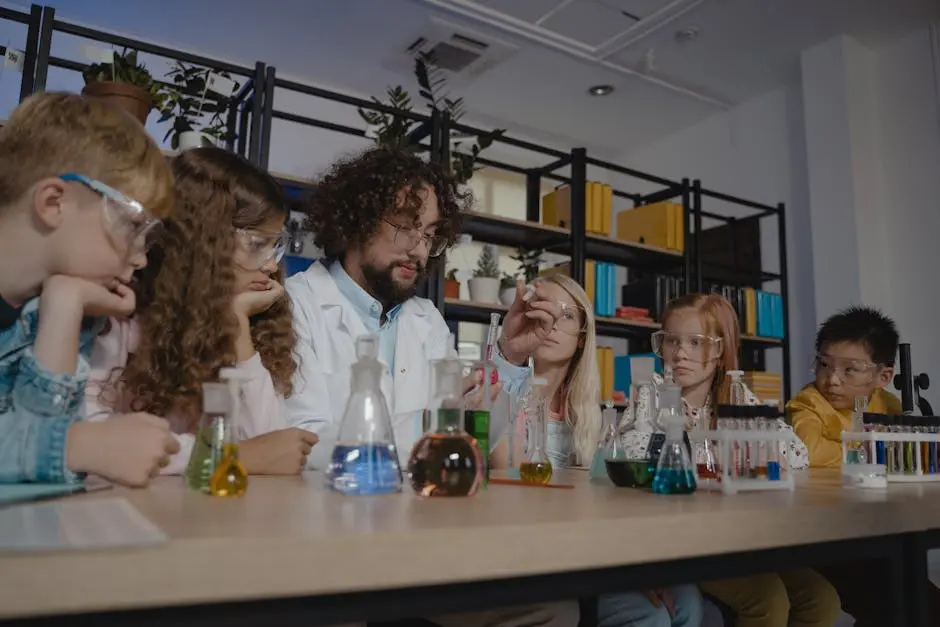Science can often feel complex and daunting, especially when you’re staring at a seemingly unsolvable problem. However, with the right tools and resources, it can become an exciting journey of discovery. Whether you’re delving into chemistry, biology, or physics, we’ve curated a list of invaluable resources that will not only assist you with your homework but will also fuel your love for science.
1. Interactive Science Simulations
Imagine walking through a cell, navigating the terrains of Mars, or witnessing a star explode—all from the comfort of your home. Interactive science simulations bring abstract concepts to life, enabling a deeper understanding that mere words and static images can fail to convey. Platforms like PhET Interactive Simulations provide free, high-quality resources covering a broad range of topics. From electricity to biology, it’s an opportunity to see the unseen, experiment with parameters, and experience the essence of scientific processes without the limitations of a traditional classroom setting.
Whether you’re a visual learner or simply enjoy a hands-on approach, these simulations cater to different learning styles, making complex theories more approachable. They provide a space where making mistakes is part of the learning process, encouraging trial and error which is often paramount in scientific exploration. This dynamic approach not only aids in homework completion but also strengthens long-term retention, turning learning into an interactive journey of discovery.
2. Comprehensive Video Tutorials
Today’s digital landscape offers vast educational resources, and video tutorials have become a staple in modern learning. These visual resources can transform daunting scientific theories into digestible bits of knowledge. Notably, websites like Khan Academy provide accessible content that systematically builds upon foundational concepts. Instructors break down complex topics, often providing step-by-step solutions and explanations that are easy to follow.
Imagine revisiting a difficult physics problem with the support of a tutor who explains every nuance. Video tutorials act as virtual mentors, available anytime you need them. They allow students to progress at their own pace, replaying lessons as needed to ensure understanding. By visualizing scientific principles in action, students can grasp abstract ideas that are pivotal in fields like chemistry and physics, ultimately improving academic performance and fostering a greater appreciation for the subject.
3. Online Science Textbooks and eBooks
In the digital age, heavy textbooks have been largely replaced by more accessible eBooks and online resources. These digital formats offer the depth of traditional textbooks with the added convenience of accessibility from anywhere. Websites such as OpenStax provide free, peer-reviewed, openly licensed textbooks, perfect for students seeking to deepen their understanding of scientific subjects at no cost.
4. Scientific Journals and Articles
Scientific journals and articles are treasure troves for students who want to delve beyond the basics. They provide insights into the latest discoveries and ongoing research. Accessing articles through platforms like Google Scholar allows students to explore peer-reviewed content across a wide range of scientific disciplines, from biology to environmental science. This not only aids in understanding current scientific discussions but also in connecting classroom learning with real-world applications.
Engaging with scientific literature cultivates critical thinking and analytical skills. It encourages students to question findings, compare hypotheses, and learn how to differentiate between scientific facts and myths. This exposure to scientific writing is invaluable, paving the way for more advanced studies and potentially sparking a lifelong interest in research.
5. Educational Science Games
Education and entertainment merge seamlessly in educational science games, which are designed to make learning engaging and interactive. For example, platforms such as Legends of Learning offer educational games tailored to various science subjects, enabling students to learn while having fun. These games challenge students to apply scientific principles in virtual scenarios, thus reinforcing their classroom knowledge while encouraging critical thinking and problem-solving skills.
6. Online Homework Help Forums
The reach of the internet means that students are never alone in their academic pursuits. Online homework help forums like Reddit’s Homework Help Community allow students to connect with peers and professionals who can offer advice and solutions to complex questions. By sharing insights and discussing different approaches to problem-solving, students enhance their own understanding and contribute to a wider learning community.
These forums are particularly beneficial for topics that require multifaceted solutions, such as multivariable calculus problems or intricate biology experiments. They foster a collaborative environment where students not only attain the assistance they seek but also cultivate communication skills that are essential in professional scientific communities.
7. Science Homework Help Websites
Dedicated websites exist to support students in need of homework assistance. Slader Science is one such platform, offering solutions and explanations for a range of science textbooks. These resources provide invaluable step-by-step guides that help students understand the logic and processes behind scientific problems, enabling them to tackle similar tasks independently in the future.
8. Virtual Science Labs
One of the limitations of traditional science education has always been the availability of lab resources. Virtual science labs, like those found on Labster, overcome this challenge by providing students with access to a full suite of lab simulations replicating real-world conditions. This technology allows students to conduct experiments they might otherwise miss due to resource constraints, turning theoretical knowledge into practical experience.
9. Study Apps for Science Students
With the rise of smartphone technology, study apps have emerged as invaluable tools for students. Apps like Quizlet offer custom flashcards and quizzes that make reviewing material efficient and engaging. They are typically designed to reinforce learning through repetition and retrieval, proven strategies for effective studying. These apps provide instant feedback, allowing students to track their progress and focus on areas needing improvement.
10. Tutoring Services and Platforms
While resources like video tutorials and forums offer considerable independence, sometimes personalized guidance can make all the difference. Tutoring platforms such as Varsity Tutors bring together expert tutors who offer one-on-one assistance tailored to individual learning styles and needs. This level of personalized attention ensures that students’ questions are addressed with specificity, and it promotes a more nuanced understanding of challenging topics.
11. Podcasts Exploring Science Topics
Podcasts have become a popular medium for consuming information and they can be a powerful aid in science education. Shows like Science Vs tackle contemporary scientific topics, debunk myths, and illuminate the wonders of science in an engaging format. These podcasts are perfect for students who prefer auditory learning or enjoy multitasking, such as listening while commuting or exercising. By presenting science in a relatable and often entertaining manner, they encourage inquisitiveness and inspire a deeper curiosity about the world.
12. Resourceful Science Apps
Science apps have revolutionized the accessibility of educational content, providing tools that enhance understanding beyond traditional classroom settings. Apps like The Elements by Theodore Gray offer interactive periodic tables, allowing students to explore elements and compounds in vivid detail. This tactile interaction with theoretical content maintains engagement and supports diverse learning styles, making complex chemistry topics more understandable and memorable.
13. Comprehensive Online Courses
The rise of online education platforms has opened pathways for learners of all ages to explore detailed science topics extensively. Websites like Coursera offer structured courses curated by esteemed institutions, covering topics across the scientific spectrum. These courses often come with video lectures, assignments, and peer-reviewed assessments that condition students to academic rigor, all while providing a flexible learning schedule that accommodates various paces and lifestyles.
14. YouTube Channels for Curious Minds
YouTube as a platform houses a wealth of educational channels that break down science topics in engaging ways. Channels like CrashCourse provide concise and vibrant explanations of intricate subjects, from ecology to astrophysics. Each video aims to simplify and contextualize scientific principles, making them approachable for students grappling with new material. By subscribing to such channels, students can consistently access updated content that supplements classroom instruction and instills a passion for lifelong learning.
15. Science Communities on Social Media
Social media is more than just a place for socializing—it’s also a hub for educational communities. Groups on platforms like Facebook’s Science Enthusiasts allow students to interact with like-minded individuals, sharing resources, posing queries, and discussing scientific phenomena. Such communities provide a supportive network that extends beyond academic institutions, encouraging collaboration and the exchange of knowledge. By participating actively, students not only enhance their understanding but also develop the skills to communicate scientific ideas effectively, critical for academic and professional success.










